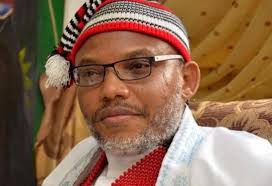Nnamdi Kanu, leader of the proscribed Indigenous People of Biafra (IPOB), has lodged a motion seeking to halt the judgment of the Abuja Division of the Federal High Court, which is set for November 20.
Justice James Omotosho had, on November 7, scheduled the judgment for November 20 in the trial of Mr Kanu on alleged terrorism offences.
The date was set after Mr Kanu’s defence was foreclosed, following his insistence that he would not enter his defence under a repealed law.
In the motion on notice, marked FHC/ABJ/CR/383/2015, which was personally filed by Mr Kanu, the IPOB leader is seeking seven reliefs.
In the application dated November 10 and filed on the same day, Mr Kanu is requesting an order to halt the delivery of judgment in charge number FHC/ABJ/CR/383/2015, scheduled for November 29.
He alleges that the proceedings were conducted under a repealed and non-existent statute and in disobedience to the Supreme Court’s directive, in violation of Section 287(1) of the Constitution of the Federal Republic of Nigeria (CFRN) 1999.
Mr Kanu seeks a declaration that, in accordance with Section 287(1) CFRN, the trial court was constitutionally obliged to adhere to the Supreme Court’s finding that Count 15 (now Count 7) “does not exist in law,” and that its failure to do so rendered all subsequent proceedings null and void.
He further seeks a declaration that the court’s failure to take judicial notice of the repeal of the 2013 Terrorism Act, contrary to Section 122 of the Evidence Act 2011, invalidates all actions taken under it.
Additionally, Mr Kanu is requesting a declaration that, in accordance with Section 76(1)(d)(iii) of the Terrorism (Prevention and Prohibition) Act 2022, the Federal High Court lacks jurisdiction to try him without proof that the alleged conduct constituted an offence under Kenyan law or any Kenyan judicial validation or extradition order.
Moreover, Mr Kanu seeks “a declaration that the plea purportedly taken on 29 March 2025, under a repealed and non-existent statute, and in violation of Section 220 of the Administration of Criminal Justice Act (ACJA) 2015, is void and incapable of conferring jurisdiction.
He also contends that forged materials amount to a constructive denial of a fair hearing under Section 36(6) CFRN.
Finally, he requests an order to set aside all proceedings and orders made by Hon. Justice Omotosho in Charge No. FHC/ABJ/CR/383/2015 for lack of jurisdiction and violation of constitutional supremacy.
Mr Kanu, who has disengaged his lawyers, has chosen to represent himself in the charge before Justice Omotosho.
He has questioned the court’s jurisdiction to try him based on the charge, which he claims is invalid as it is based on repealed laws.
Mr Kanu asserts that the Terrorism (Prevention) (Amendment) Act 2013 and the Customs and Excise Management Act, Cap C45 LFN 2004, on which the charge is founded, have been repealed.
He further argues that the court’s failure to take judicial notice of these repeals renders the proceedings conducted thus far a nullity.
Mr Kanu maintains that his trial is a conspiracy that has been predetermined, alleging that the British authorities wish for him to be convicted and imprisoned.
He claims to have been aware of the British authorities’ intentions regarding his fate for about a year and a half.
However, Justice Omotosho stated he was unaware of Mr Kanu’s claims.
The judge, who asserted that he had no connection with the British authorities, also clarified that he was not the judge during the time Mr Kanu referenced.
The IPOB leader insisted that he would only enter the witness box to give his testimony after being informed under which law he was being tried.
In his ruling, Justice Omotosho held that Mr Kanu, having exhausted the six days allocated to him by the court to conduct his defence, had waived his right to do so.
The judge stated he would have extended the days allocated to Mr Kanu for his defence had he chosen to proceed.
He remarked that Mr Kanu, having failed to utilise the opportunity given to him for his defence, could not claim to have been denied the constitutionally guaranteed right to a fair hearing.
“This court has given the defendant an opportunity under Section 36, as required by the constitution, and I will not allow this to continue.
“It is on this basis, without hesitation, that I assert that the defendant has waived his right,” Justice Omotosho concluded, adjourning the matter until November 20 for judgment.

